
Feb 1, 2023
At FDA, we believe that healthy habits start early! In honor of Children’s Dental Month, we’re talking about your child’s baby teeth: what to expect, and how to care for them. Here are some frequently asked questions:
1) How Important are Baby Teeth?
Although they are eventually replaced by adult teeth, baby teeth are still very important! Not just cute, they actually help with chewing solid food, learning to talk, and they serve as placeholders for when the big teeth grow in.
2) When Will My Baby Develop Baby Teeth?
Children develop at different rates, but typically a baby will sprout his or her first tooth between 6 to 12 months of age. Usually, the two bottom front teeth pop up first, with the top two teeth following right behind. New baby teeth continue to make their appearance until about age three. Around age six, you can expect your child to get their first loose tooth!
Your baby or toddler may have lots of space between their teeth and that’s ok! This is normal and allows more space for adult teeth when it is their time to move in. For more information on new teeth timing, check out the American Dental Association’s Eruption Chart.
3) When Should My Child Start Brushing and Flossing?
Even though all baby teeth will eventually fall out, tooth decay and cavities are still possible, even at a young age. To clean your baby’s first tooth, use a wet washcloth to gently wipe the tooth and the front of the tongue. Do this after feeding your baby and again before bed.
When your baby has more than one tooth, you can start brushing them with a soft-bristled, baby toothbrush or you can use your finger. Use an ADA-approved toothpaste specifically formulated for babies or just plain water works too! Flossing isn’t necessary until two or more teeth are touching together, usually between the ages of two and three.
4) When Should My Child First Visit the Dentist?
Every child is different and we want to help them build a positive relationship with oral health and dental care. We recommend scheduling your child’s first dentist appointment between their first and their third birthday. Give us a call to determine if your child is ready for their first appointment. At this appointment, Dr. Brunacini or Dr. Karagiorgos will help them to feel comfortable with the dental chair and all of the tools we use. We will examine your child’s teeth for cavities and will also give you and your child a lesson on proper brushing technique.
If you have any questions or concerns about your child’s little pearly whites, feel free to get in touch – we’re here to help! Our team of fun and friendly dental professionals looks forward to caring for your child and helping them develop life-long healthy habits! Give us a call at 207.781.5900!
Jan 2, 2023
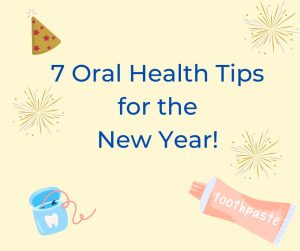
Happy New Year from the Falmouth Dental Arts team! The new year is always a great time to recommit to making positive changes to your health routine, and oral health is no different! Small changes, repeated often, become habits. At FDA, we believe that practicing healthy habits at home can make a big impact on your oral health. Here are seven tips to improve your oral health in 2023. They are tried and true and are sure to help you!
1) Brush for Two Minutes, Two Times a Day
Gently brush your teeth for two minutes, twice a day, using a soft-bristled, ADA-approved toothbrush. Check out our tips for proper brushing technique. We are always happy to make suggestions about the best type of toothbrush and fluoride toothpaste, so please don’t hesitate to just ask us!
2) Floss Your Teeth Once a Day
In addition to brushing twice daily with a fluoride toothpaste, it is important to floss your teeth at least once a day to remove plaque and food particles between your teeth. Use traditional string floss or flossers to gently get between each tooth.
3) Use a Mouth Rinse With Fluoride
Using products with fluoride helps to strengthen tooth enamel and reduce bacteria, which helps with overall oral health and teeth sensitivity. We offer several professional-strength, alcohol-free mouth rinses made with essential oils.
4) Make Healthy Food Choices
There are many dietary changes you can make which will have a positive impact on your oral health and will help keep your smile shining bright! For example, you can:
- Reduce the sugar in your diet.
- Cut back on acidic foods and beverages, like citrus fruits and soft drinks.
- Rinse with water after meals, sugary snacks, and drinks.
- Increase your intake of calcium-rich foods like cheese and yogurt.
5) Kick Tobacco to the Curb
Giving up smoking and other forms of tobacco use is one of the best things you can do for your oral health and overall health. Tobacco use is linked to tooth decay, gum disease, and oral cancer. There is help available to quit this highly addictive habit, and we’ll be here to cheer you on. Let us know if you need support!
6) Treat Yourself to an Electric Toothbrush
Your oral health is worth it! An electric toothbrush can upgrade your oral health routine by brushing more efficiently and by making it easier to brush for a full two minutes. This can be especially helpful for those with arthritis or other conditions that make brushing by hand more difficult.
7) Routine Dental Visits
Start the new year off right by scheduling your recommended cleanings or other dental care appointments. Dr. Brunacini and Dr. Karagiorgos recommend coming in for a check up at least twice a year for optimal oral health. Preventative dental care is one of the best things you can do for yourself in the new year. Give us a call at 207.781.5900 if you would like to schedule an appointment – we’re here to help!
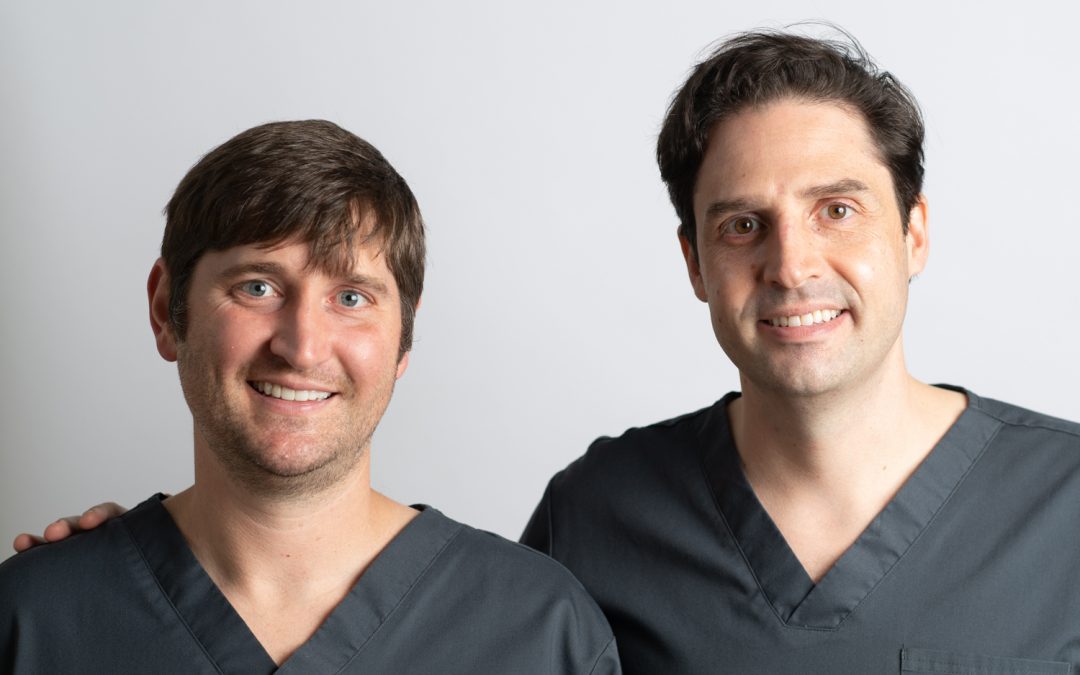
Mar 15, 2022
March is a month full of celebrations to make you smile…like Dental Assistants’ Week and National Dentist’s Day! Celebrated on March 6, National Dentist’s Day is to recognize all the men and women who keep our teeth and mouths healthy! At FDA, we are lucky to have two of the most amazing dentists around – Dr. Brunacini and Dr. Karagiorgos, who are both deeply devoted to providing the best oral health care possible. We wanted to know more about what makes them both such great dentists, so we asked them a few questions about their profession.
What is your favorite part of your job?
Dr. Brunacini: I like having the ability to find a solution to someone’s dental concerns – whether it is in an emergent situation or minor day-to-day concerns. I am always encountering new situations that require me to pull from previous experiences or to think “outside the box.” I love working together with patients to find the right care for their needs.
Dr. Karagiorgos: Everything. I absolutely love being a dentist! Dentistry is a perfect blend of art and science and feeds my passion for each. My career before dentistry was engineering. In my mid-twenties I became very ill and came close to losing my life. Thankfully, I survived. Going through that experience, I came to realize how short life can be and that each day is a gift. I spent a good deal of time looking for a career that could fulfill me professionally, personally, and allow me to help people. I am very fortunate to have found all of those things in dentistry. The fact that I get to do this job at FDA with a wonderful business partner, the best staff, and fantastic patients makes it just that much better.
What is the most surprising thing that has happened during your dental career?
Dr. Brunacini: It amazes me how much dentistry is in the “people business” more than anything. In dental school, all I could focus on was developing the technical skills to do the procedures, but you soon realize that it really is about building trust with patients and creating relationships by treating them well. That is what we strive to do at FDA everyday.
Dr. Karagiorgos: Before dental school I was under the impression that when you graduate that you are a dentist and then you work as a dentist. Having been out of school for many years now, I have a different understanding. While graduating dental school prepares a person to learn to be a dentist, I find that the field is changing so quickly nowadays that unless you are constantly expanding your education, you are falling behind.
What are you looking forward to in dentistry?
Dr. Brunacini: I am excited about the technological advancements on the horizon. The continued progression of digital dentistry gives us the ability to better plan out treatments before procedures. This ability will continue to improve outcomes for our patients, which is always our goal.
Dr. Karagiorgos: This is a very interesting time in dentistry. The integration of computers and technology into dentistry makes it a very dynamic profession. Dentistry at Falmouth Dental Arts today is almost unrecognizable from when I first started. To remain a licensed dentist in Maine we have specific amounts of required continuing education that we need to fulfill by taking classes in person or online, attending seminars, and dental meetings. Brian and I are finding that we are far and away exceeding these requirements in order to keep FDA at the crest of the wave of modern dentistry.
Thank you Dr. Brunacini & Dr. Karagiorgos for all you do to keep us healthy!
Another great way to say thank you to the doctors is to keep up with your home oral health care – brushing twice-a-day, flossing once-a-day – and to schedule regular check up appointments. If you need to schedule your next appointment, please give us a call at 207.781.5900.
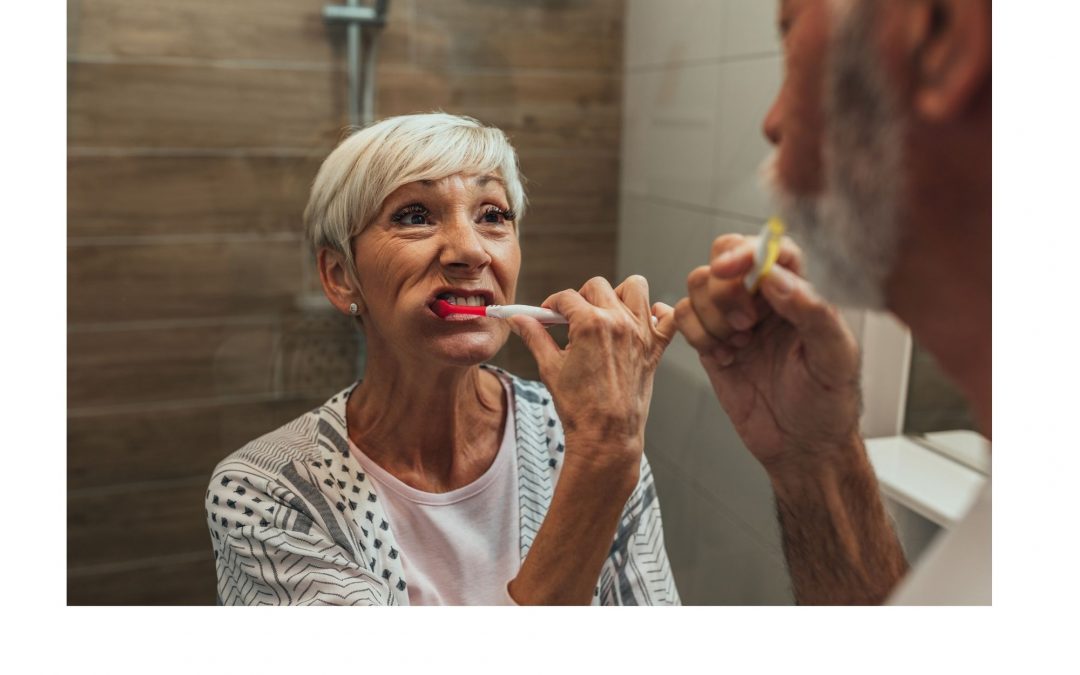
Sep 15, 2021
September is here which means back-to-school and back to our routines. As you get back into the swing of things, don’t forget about your teeth! Your daily oral health routine is important for not just your mouth, but your overall health as well. We’re here to help with our top three tips to achieve better oral health!
HOW TO KEEP YOUR SMILE IN SHAPE
1. Have a Consistent Oral Routine.
- Brush your teeth twice a day with fluoride toothpaste (remember to change the toothbrush, every 3 months!).
- Clean between your teeth (you can use floss, a flossing device, or an interdental brush, whatever is more comfortable for you!).
- Scrape your tongue.
2. Eat a Healthy Diet.
- Focus on vegetables, fruits, whole grains, and legumes. They are packed with the nutrients your body needs to be up and running, and they help support oral health, too!
- Limit foods high in sugar, such as processed foods. This includes alcohol! Sugar causes cavities.
- Stop smoking or using any tobacco products. Not only does smoking stain your teeth, but it can also cause gum disease and cancer in the long term.
3. Visit Dr. Brunacini or Dr. Karagiorgos for Regular Check-Ups.
- The best way to fix dental issues is to detect them as early as possible. Visiting us will prevent dental issues from going unnoticed or getting worse.
Having a good oral health routine can be as easy as 1,2,3! Consistency is key when it comes to establishing new habits, so stick with it. If you have questions or concerns about any of these tips, please let us know! You can ask your hygienist, Dr. Brunacini, or Dr. Karagiorgos at your next appointment. It is a conversation that we have with many patients and it will help you have better overall health!
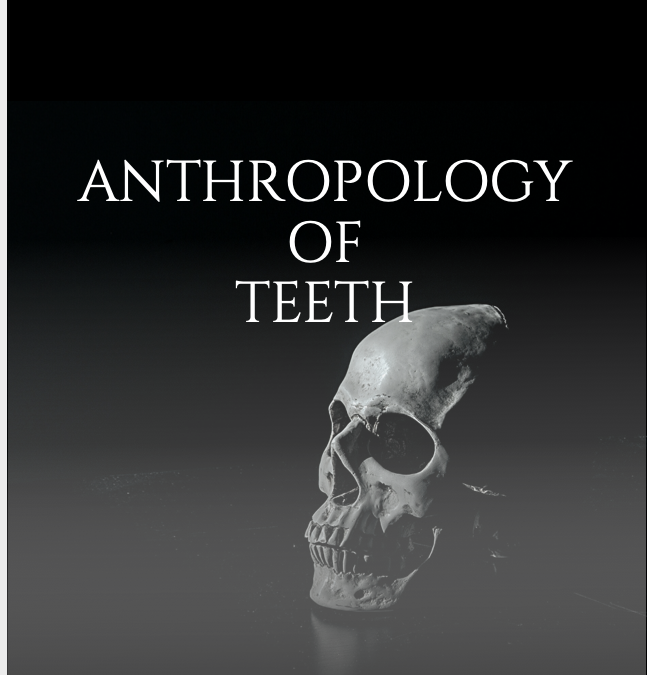
Aug 25, 2021
Not only does Dr. Brunacini love to learn more about your personal dental history during a checkup, he also loves to learn more about the larger history of human teeth. What’s not to love?! Our teeth are the result of hundreds of millions of years of evolution and are amazing! This month we continue our Dental Anthropology interview series with Dr. Brunacini. Join us for Part 2: The Evolution of Our Teeth.
What interests you about the evolution of teeth?
Dr. Brunacini: I think there is always fascination in where we came from and there is so much for us to learn! Learning more about our dental history helps us know more about the issues that impact a lot of patients currently. For example, we are learning that as our jaws have become smaller over time our ability to breathe through our nose properly has also been affected. This may contribute to developing sleep apnea and/or bruxism (grinding your teeth) and can affect multiple systems in the body.
What else have we learned about how our teeth have evolved over time?
Dr. Brunacini: As I mentioned our jaws have become smaller over time, but our teeth have changed very little. This is due to our early ancestors subsisting on a diet of chewy leaves, roots, and raw meat, which required more chewing and thus contributed to them developing much larger jaws. This allowed enough room for all of our teeth to develop properly and erupt into the correct position. As man evolved to have larger brains, our diet became softer and more processed, and our jaws shrunk. The wisdom teeth stuck around though, but with less space to accommodate them. That’s why we often have to remove wisdom teeth for our patients!
Is there an evolutionary explanation for some of the current-day dental afflictions?
Dr. Brunacini: The evolution of our diet plays a significant role in cavity formation. Cavities can develop due to eating more soft, processed foods. Of course, proper brushing and flossing help reduce the risk of cavities, but cultures that do not eat sugary, processed foods have significantly fewer dental problems. Processed foods also require less chewing, which contributes to improper jaw development and misaligned teeth. All the more reason to eat a healthy diet and come in for regular checkups with us!
Thanks, Dr. Brunacini!
We’ll continue this series later on this fall with a final interview with Dr. Brunacini on the topic. If you have a question on our dental evolution or need to schedule a checkup, please give us a call at 207.781.5900.
Apr 10, 2021
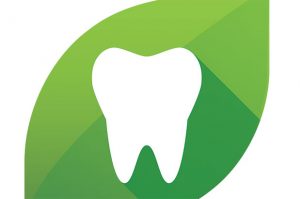
Image courtesy of www.seattlemag.com
Earth Day is a good reminder for us to be mindful of the ways our habits impact the environment…even our healthy habits. At FDA, we make an effort to go green when we can and know many of our patients are making the same effort. There are steps we can all take to improve our environmental footprint as we improve our oral health. Here are 3 ways you can make your oral health routine more eco-friendly:
Turn off the Water While You Brush.
This tip is an oldie but a goodie – turn off the tap while brushing your teeth. This simple act can save up to 8 gallons every day and over 200 gallons a month! Not only will you be conserving water and helping the planet, but you’ll also be saving money on your water bills. Turn off that tap!
Explore Green Floss Alternatives.
We talk about it constantly – dental floss is an important component in your oral health care routine. Flossing once a day helps prevent gum disease and cavities. It truly is one of the best things you can do for your oral health, but it’s not necessarily one of the best things for the planet. Most dental floss is made out of nylon and comes in plastic containers, which all end up in the landfill, or worse, the ocean. There are sustainable alternatives, however. Look for silk dental floss or consider a Water Flosser. Here is a resource for exploring some eco-friendly alternatives. Take care of your gums while you reduce the amount of waste in your dental routine!
Make Your Own Toothpaste.
DIY toothpaste? Yes! We’ve posted recipes on our blog before and in honor of Earth Day this year we thought we’d share one of our all-natural recipes that will leave your mouth feeling fresh and leave less plastic waste behind. Most of these toothpaste ingredients can be found at any health food store or online retailer:
Coconut Oil Toothpaste
Ingredients
- ½ cup coconut oil
- 2 to 3 TBS baking soda
- 2 small packets of stevia powder
- 15 to 20 drops of peppermint or cinnamon essential oil (for flavor)*
- 10 drops myrrh extract (optional for flavor)*
Melt or slightly soften the coconut oil, then mix in all other ingredients and stir well. Mix using a fork if you are using semi-hard coconut oil and use a spoon for liquid coconut oil. If you melted the coconut oil using a heat source, stir the mixture as it cools to prevent the baking soda from separating.
*Essential oils can be potent, so start with a few drops then add more to taste. Make sure to use therapeutic-grade essential oils that are safe to ingest. Feel free to substitute other essential oils if you prefer.
At FDA we strive to take care of the planet as we provide the best oral health care for our patients. From using digital records and x-rays for our patients to our mercury-free fillings to our commitment to Holistic Dentistry, we are continually finding ways to be more sustainable in our practice. This Earth Day, we hope you join us in making an effort to improve your oral health routine for the health of the environment. If you have any questions about other ways to be eco-friendly while caring for your smile or need to schedule your next appointment, give us a call at 207.781.5900.






